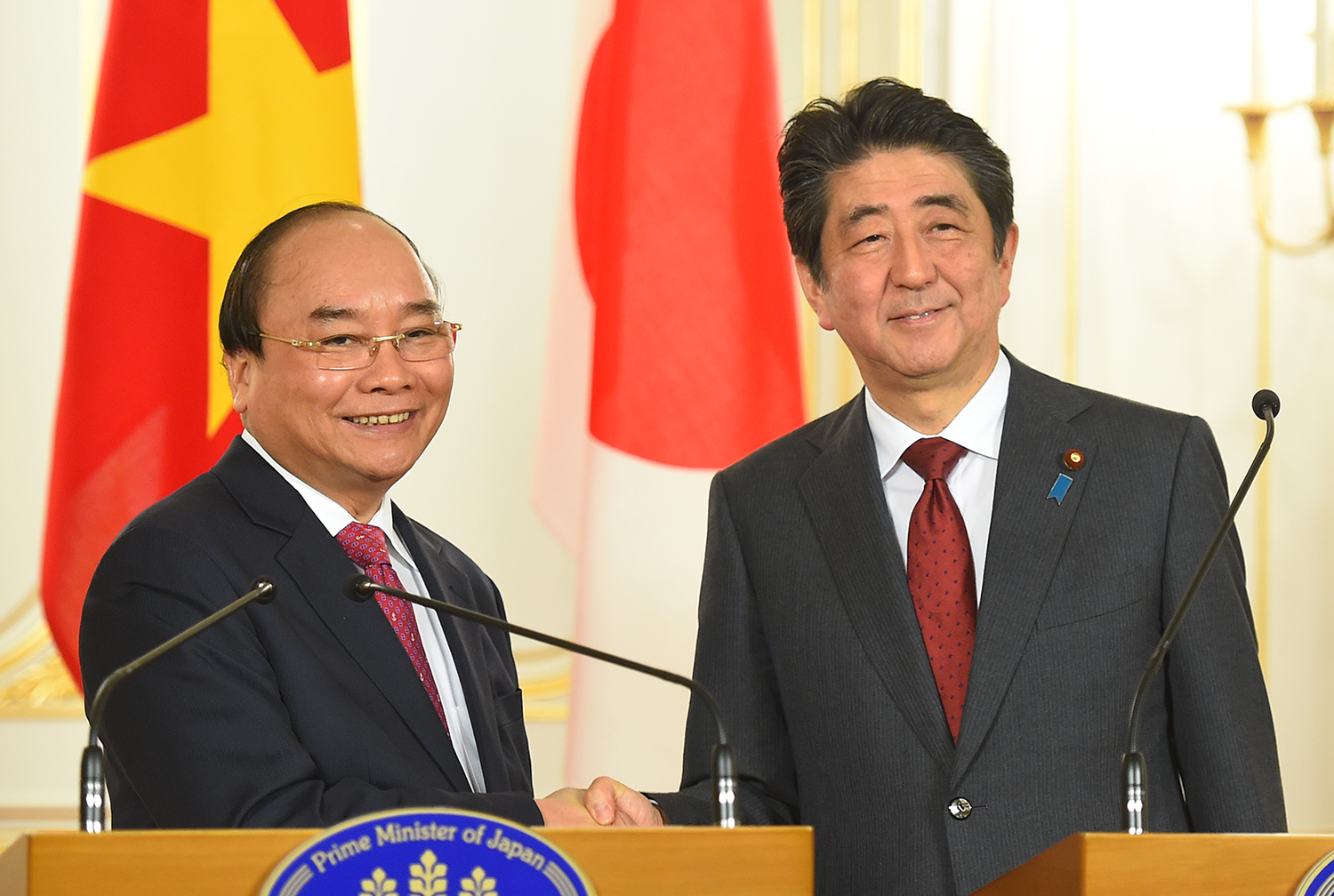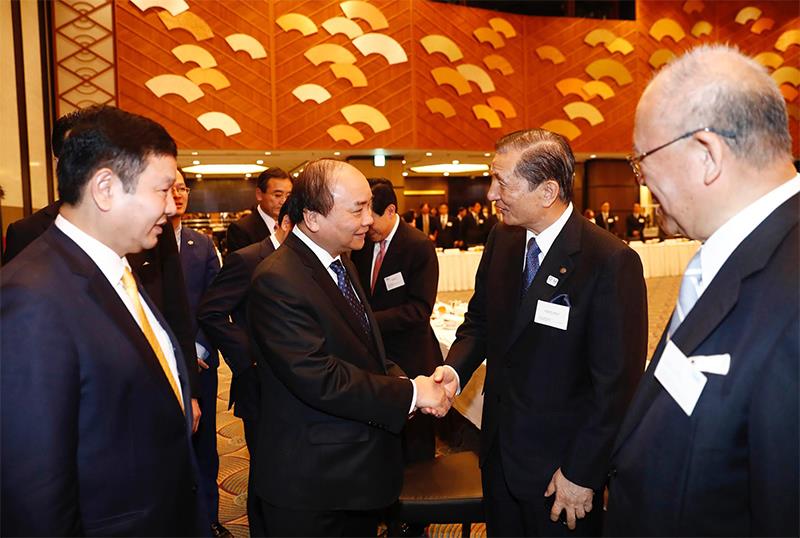Japan and Vietnam to work out auto industry action plan within 2017
 |
| The Vietnamese and Japanese Prime Ministers pledge to deepen the two countries' partnership |
Accordingly, the Vietnamese side will implement concrete and strong measures consistent with its World Trade Organisation (WTO) commitments, aiming to sustain and expand domestic production of Completely Built Up car units (CBUs) as first priority.
Both sides will establish a working group and develop concrete measures incorporated in an action plan by the end of this year. The Japanese side confirmed its support for the Vietnamese automobile and supporting industries.
Besides electronics production, agricultural machinery production, agro-seafood processing, shipbuilding, environment and energy, the auto and auto parts production industry is one of the six selected industries in Vietnam’s Industrialisation Strategy as outlined in the Vietnam-Japan Cooperation Framework until 2020 with vision to 2030 ratified by PM Phuc’s predecessor Nguyen Tan Dung back in July 2013.
In the joint declaration, the Japanese side confirmed supporting Vietnam’s development plans of the six selected industries. Japan will consider training advanced engineers for the six industries.
The two sides targeted doubling the two-way trade and investment volume during 2014-2020. Investment-wise, they said they would cooperate to improve the investment environment in Vietnam, strengthen the governance and restructuring of Vietnamese state-owned enterprises, and ensure information disclosure by companies. Both leaders expressed their wish to promote more investment from Japanese companies into Vietnam and to promote public-private partnership (PPP) projects.
PM Phuc thanked Japan for being the biggest ODA donor of Vietnam, contributing to sustainable social and economic development and poverty reduction. He also lauded the active role and contributions of Japanese companies to the economic development and nation building in Vietnam.
The leaders also share the intention to cooperate in resolving the bottlenecks which hinder the implementation of Japan’s ODA projects.
On the occasion, the two sides witnessed the signing of the exchange of notes of ODA projects worth ¥100.3 billion ($91 million) pledged by Japan in the 2016 fiscal year. This involved four projects, namely the Maritime Security and Safety Capacity Improvement Project, the Ben Tre Water Management Project, the Bien Hoa City Drainage and Wastewater Treatment Systems Project (Stage 1), and the Hoa Lac Science and Technology City Development Project (phase II).
Additionally, it also included three grant assistance projects in the fields of disaster prevention and human resources development, as well as the loan agreement for the Hoa Lac Science and Technology City Development Project.
The two sides agreed that Japan would provide support to carry out high-quality, large-scale, national infrastructure projects of critical importance, including the North-South Expressway and urban railways. They would continue to cooperate in implementing the Hoa Lac Science and Technology City Development Project. Both sides would continue the discussion on the expressway project connecting Hanoi (Vietnam) and Vientiane (Laos).
| As part of the official visit, which lasted from June 4 to 8, PM Phuc met with the leaders of a number of Japanese companies with an interest in Vietnam. Kuniharu Nakamura, CEO and president of Sumitomo Corporation, which has just signed the $4-billion agreement with the Hanoi People’s Committee and BRG Group to develop a smart city in the north of Hanoi, along the two sides of Nhat Tan-Noi Bai Highway, proposed adjusting the functions of some areas in the smart city and expand the total area. He said he hoped PM Phuc would propose that the Japanese government lengthen Metro Line No.2 in Hanoi, which is being developed from Japanese ODA, to reach the smart city. He also expressed hope that the North Van Phong BOT thermal power plant project that Sumitomo has been pursuing for the past ten years would soon receive the investment certificate. PM Phuc said that he had assigned the Ministry of Industry and Trade to report on the project with haste, so that a final decision can be made.
Keisuke Nishimura, executive vice president at Kirin Holdings Co., Ltd., said the company is planning to invest in Vietnamese beer, beverage, and food companies and hopes to become the strategic investor in a number of beer companies in Vietnam. Canon chairman and CEO Fujio Mitarai said he is worried about the underdevelopment of the Vietnamese support industries, adding that this is why 90 per cent of spare parts and moulds used in Canon’s Vietnamese plants have to imported. Tsugio Mitsuoka, president/COO at IHI Corp., told the PM that his company is planning to ramp up investments in Vietnam through building thermal power plants with reduced CO2 emission, as well as roads and bridges to help improve traffic. Toshiaki Higashihara, president and representative executive officer of Hitachi Ltd., said the company will continue investing in high-tech infrastructure. In addition, a representative of Fujitsu expressed hopes to join deeper into the development of Vietnamese high-tech agriculture. Yamato Holdings hoped to grow its transportation business in Vietnam and expand to other countries in the ASEAN, while Mizuho Financial hoped to increase cooperation with Vietnamese organisations in finance and banking. The representatives of Japanese companies proposed that the Vietnamese government continue improving the investment environment, specifically land regulations, tax incentives, loosening of foreign ownership limit in Vietnamese companies, having easier visa rules, and paying more attention to training human resources. PM Phuc said that he would assign government agencies to find ways to solve these problems. Regarding human resources training, he asked FPT University, Vietnam-Japan University, and other schools to work on improving training standards. |
What the stars mean:
★ Poor ★ ★ Promising ★★★ Good ★★★★ Very good ★★★★★ Exceptional
Latest News
More News
- Hermes joins Long Thanh cargo terminal development (February 04, 2026 | 15:59)
- SCG enhances production and distribution in Vietnam (February 04, 2026 | 08:00)
- UNIVACCO strengthens Asia expansion with Vietnam facility (February 03, 2026 | 08:00)
- Cai Mep Ha Port project wins approval with $1.95bn investment (February 02, 2026 | 16:17)
- Repositioning Vietnam in Asia’s manufacturing race (February 02, 2026 | 16:00)
- Manufacturing growth remains solid in early 2026 (February 02, 2026 | 15:28)
- Navigating venture capital trends across the continent (February 02, 2026 | 14:00)
- Motivations to achieve high growth (February 02, 2026 | 11:00)
- Capacity and regulations among British areas of expertise in IFCs (February 02, 2026 | 09:09)
- Transition underway in German investment across Vietnam (February 02, 2026 | 08:00)

















 Mobile Version
Mobile Version